Will we be Warm this Winter?

Climate Cymru – of which Cytûn is a member – has launched a campaign called Warm This Winter (Cynnes Gaeaf Yma) in Wales, to urge the Welsh and UK Governments to act on the interconnected cost-of-living, energy and climate crises. The campaign is led by antipoverty and environmental groups, and backed by hundreds of organisations and thousands of individuals from every corner of Wales.
Warm This Winter in Wales has four headline demands:
- Emergency support for vulnerable households
- An ambitious energy efficiency programme
- A rapid scale-up of low-cost renewables
- Free us from fossil fuels
The UK-wide Warm this Winter campaign is making similar demands of the UK Government. The campaign in Wales has somewhat different demands to reflect the different policy stances of the UK and Welsh Governments.
Sam Ward, Manager for Climate Cymru said: “There is an escalating cost of living crisis, an energy crisis, and an ongoing climate emergency. These crises are connected. They have shared causes, like fossil fuels, which are making them all worse, and shared solutions that can help us get out of this mess, like mass insulation of Welsh homes and investing in super-cheap, clean renewable energy. We hope to work productively with the Welsh Government on our demands and their implementation, as well as with UK partners to make sure UK Government does its part to unlock the finances and levers that Welsh Government needs to tackle these issues at the pace and scale that the situation demands”
Climate Cymru is a coalition of over 300 Welsh organisations, and almost 14,000 individuals who have signed up to work together to tackle the climate and nature emergencies.
The demands of Warm This Winter align well with calls previously made by many Cytûn member churches, such as the letter sent to Liz Truss MP, the Prime Minister, by a number of faith leaders, including leaders from Cytûn members the Baptist Union of Great Britain, the Methodist Church, the United Reformed Church and the Church in Wales, along with the Free Churches Group and Churches Together in Britain and Ireland. The Social Justice Department of the Catholic Bishops Conference of England & Wales has published a briefing paper looking at policy options from the perspective of Catholic Social Teaching.
Measures already taken for households

The UK Government announced on 21 September a package of support for households across the UK. The Energy Price Guarantee ensures that the average unit price for dual fuel customers paying by direct debit will be limited to 34.0p/kWh for electricity and 10.3p/kWh for gas, inclusive of VAT, from 1 October. Average standing charges for customers on default tariffs will remain capped in line with the levels set by Ofgem for the default tariff cap from 1 October, at 46p per day for electricity and 28p per day for gas, for a typical dual fuel customer paying by direct debit. In addition, the Energy Bills Support Scheme provides an automatic non-repayable discount of £400 to all households with a domestic electricity connection. There is an additional £1,200 of support for those in receipt of some benefits. This will be paid automatically in instalments during the year.
Welsh Government has announced some additional measures. These include a Fuel Support Scheme, offering £200 for those on a number of benefits, such as Universal Credit, Pension Credit and Carers’ Allowance – the full list can be seen here. Unlike the UK Government schemes, those eligible need to apply to their local authority. A further £150 is available under the Cost of Living Support Scheme for those who pay Council Tax Bands A-D and those who in receipt of the Council Tax Reduction Scheme. In most cases, this will be deducted from the Council Tax bill automatically, but in some cases an application will need to be made. Those who live in such a property but are not liable for the Council Tax (such as many clergy living in church-owned property) are not eligible, but can apply to their local authority for a discretionary payment.
Measures already taken for non-domestic customers (including churches)
On September 21, the UK Government announced an Energy Bill Relief Scheme for non-domestic customers. For these customers, the government supported price has been set at £211 per megawatt hour (MWh) for electricity and £75 per MWh for gas. The price will be applied automatically for six months (until 31 March 2023) – replacing the contract prices that had already been issued to many churches and other customers. Within three months (therefore before Christmas) the UK Government will publish a review of the scheme, and decide which customers remain “vulnerable” and so in need of further support.
Cytûn will be contributing evidence to this review of the need for further support for many churches and church-owned buildings which provide essential community services. To help with providing this evidence, we would welcome examples of the contract prices offered to churches prior to the announcement of the Energy Bill Relief Scheme, and how this relates to the income of the church. Please send such evidence to gethin@cytun.cymru It will be helpful also if you can describe how the building(s) are used by the church and wider community. We are, with colleagues from the Third Sector Partnership Council, making the case to Welsh Government also of the need for support for the essential community services run from church premises.
Welsh Government Economy Minister Vaughan Gething MS suggested that the UK scheme might not be sufficient to meet the needs of customers in Wales, and suggested that Welsh Government might offer some additional support. The only specific help announced at the time of going to press is £1 million to support Warm Banks (by analogy with food banks) where communal premises – such as churches – are opened to the community to enable people to keep warm together rather than heating their homes separately. This was announced by First Minister Mark Drakeford MS in the Senedd on September 20, but full details were not available at the time of going to press. A coalition of Christian charities, Warm Welcome UK, providing practical support to churches who wish to do this, was launched on September 28. Some local authorities in Wales have begun contacting local churches to seek their support in providing facilities of this kind.
Looking to the longer term

In the Senedd on September 21, during a debate on a Senedd Committee report on the current Warm Homes programme in Wales, Jane Hutt MS, the Minister for Social Justice in Welsh Government, confirmed that the scheme will increase its budget to £30 million for this financial year, pending publication of a full review before the end of 2022. The Committee was critical of the current scheme in a number of ways, notably that more than half of the expenditure had been on installing new gas boilers, rather than in improving household insulation and moving away from fossil fuel provision, as Warm This Winter is demanding.
The Minister drew attention to the fact that the scheme had now been extended to cover the cost of installing solar panels and battery storage, where appropriate. In November, Welsh Government will introduce a winter fuel campaign, to provide free advice to households on reducing their energy bills.


UK Government has been reluctant to support moves away from fossil fuels to renewables. For example, the Energy Profits Levy (often referred to as a “windfall tax”) on the excess profits of fossil fuel companies has been applied for six months only, and substantial rebates were available to offset the costs of new oil and gas exploration in the UK against the levy. Warm This Winter is campaigning for these priorities to reverse, so that financial incentives are offered for Investment in renewable energy rather than fossil fuels. Coupled with reform to the energy market (which is currently tied to the price of gas) this would allow the fact that, for example, generating offshore wind energy is nine times cheaper than generating it from fossil fuels, to feed into lower bills for households and non-domestic customers, reducing the need for expensive Government support.
Falls Awareness Week, October 3-7
Building on past successes and aligned with prudent healthcare approaches, older citizens are at the heart of #FallsAwareness2022 week. The 2022 campaign is called Steady on Stay Safe. This is a systematic, public health approach based on similar, very successful, attempts at reaching as many older people in the community as can be reached, comparable to community deployment in Canterbury New Zealand. Evidence from studies in the Southern Hemisphere indicate a 25-30% reduction in the incidence of falls that require health intervention.
Does it cost anything? No, our only ask is that you take 2 minutes to talk to older people that use your church premises or attend services.

If the answer is YES, then you can talk of primary falls risks and urge older people to seek help to ensure that they lower the risk of falling again and maybe suffering a serious injury. Quite often it is as much about encouraging people to adopt a more positive and healthy lifestyle: timely advice is key to reducing risks, and you can get more information by visiting the following websites:
Care & Repair Cymru: www.careandrepair.org.uk/falls (Telephone: 0300 111 3333)
Age Cymru: www.agecymru.org.uk/falls (Telephone: 0300 111 3333)
Age Connects: www.ageconnectswales.org.uk/falls (Telephone: 01639 617 333)
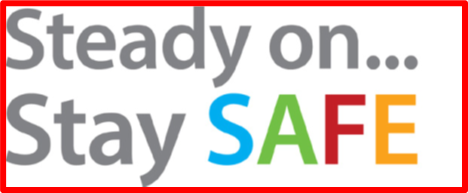

Hate Crime Awareness Week 2022: 8-15 October 2022

Hate Crime Awareness Week is a national week of action to encourage communities affected by hate crime, local authorities, police forces and other key partners to work together to tackle local hate crime issues. This year’s theme is #WalesTogether. On Friday October 14 there will be a particular focus on hate crime related to faith and religion.
Amongst events already announced is a webinar entitled Exploring the impacts of hate on Monday October 10 at 1.30pm. Nick Olson from Cardiff City Council’s Community Cohesion Team and Becca Rosenthal from the Wales Hate Support Centre will discuss the impact of hate in Wales and in local areas such as Cardiff. Follow the Eventbrite link above to register.
Black History Wales 2022-23 | Young People, the Time is Now!
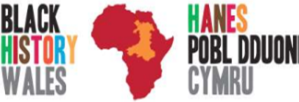
Race Council Cymru is launching Black History Wales in multiple locations during October. The free events will be held at:
1 October | 12-4pm Family Day with Arts stalls, music performances & presentations at St. Fagans National Museum of History Cardiff CF5 6XB
6 October | 6pm to 9pm | Black History Wales National Youth & Community Awards 2022
Presentations, performances and Youth awards at the Senedd, Cardiff Bay CF99 1SN
15 October 2022 | Time TBC | Black History Wales 2022-23 Launch (Nth East Wales) at Tŷ Pawb, Market Street, Wrexham LL13 8BY
22 October 2022 | Time TBC | Black History Wales 2022-23 Launch (Nth West Wales) at Pontio Arts and Innovation Centre, Bangor University, Deiniol Rd, Bangor LL57 2TQ
28 October 2022 | 6pm to 11pm | Black History Wales Youth Music Festival 2022 at Glanfa Stage, Wales Millennium Centre, Bute Place, Cardiff Bay, CF10 5AL
29 October 2022 | Time TBC | Black History Wales 2022-23 Launch (West Wales) Venue TBC
CONTROVERSIAL ‘BREXIT FREEDOMS’ BILL PUBLISHED
Cytûn’s Wales & Europe Working Party at its meeting on September 26 heard that issues relating to Brexit are not yet behind us. On September 22, the UK Government introduced to Parliament the Retained EU Law (Revocation and Reform) Bill. If passed, it would set a deadline of 31 December 2023 for most remaining secondary legislation deriving from the UK’s membership of the European Union either to be assimilated into UK law or to be revoked. The whole process must be complete by 23 June 2026. Both UK and Welsh Governments will be given power to engage in this process, with only minimal parliamentary scrutiny. The Counsel General for Wales, Mick Antoniw MS, has written to the UK Government expressing his concern that the Bill gives powers to UK ministers to legislate in policy areas devolved to Wales in a way which, he says, is “contrary to the devolution settlement”.
A key aim is to reduce what the Bill calls “regulatory burdens” which the UK Government believes inhibit economic growth. In its Growth Plan announced on September 23, the UK Government refers to reducing environmental protections, many derived from EU law. There is concern that protections in other areas, such as employment and health, may also be lost – deliberately or accidentally – during this process, which will necessarily be rushed to meet the deadline.
Although the detail is technical and complex, the effects on the lives of individuals, communities and nature could be profound. Senedd Research has produced a briefing, which can be read here.
WORLD COUNCIL OF CHURCHES CALLS FOR PEACE IN EUROPE
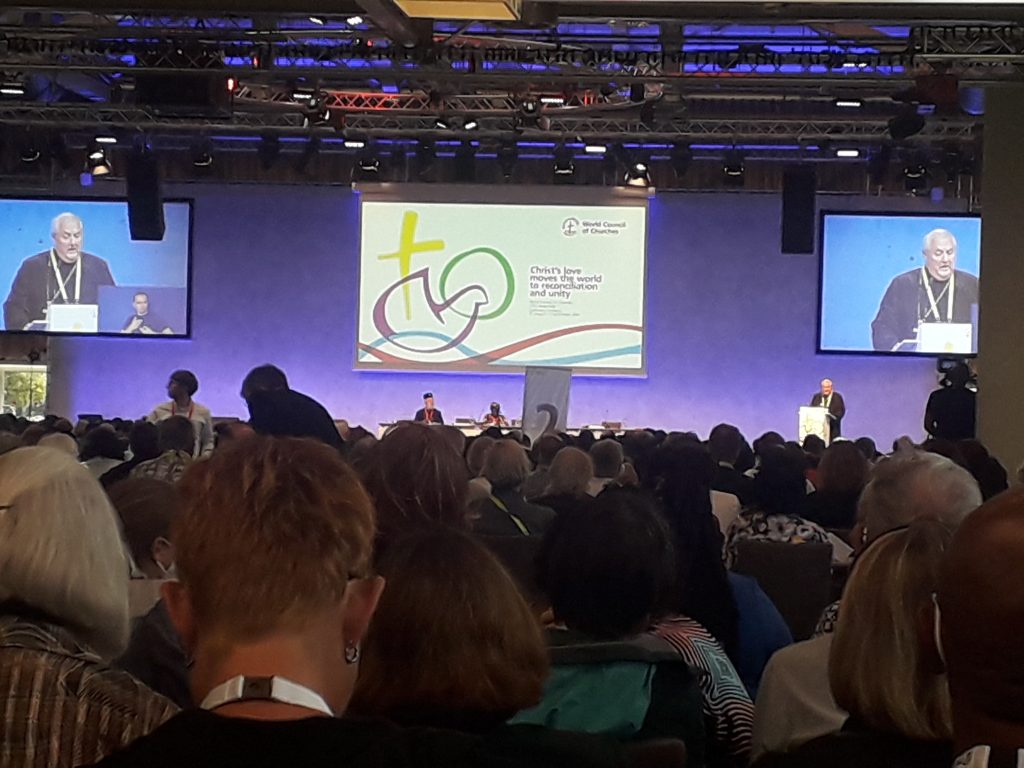
The World Council of Churches met in Karlsruhe, southern Germany, from August 30 to September 8 2022, with representatives from the Church in Wales, the Presbyterian Church of Wales, the Union of Welsh Independents and Cytûn present from Wales, as well as representatives of British member churches of Cytûn such as the Methodist Church, the United Reformed Church and the Baptist Union of Great Britain.
Meeting on the continent of Europe, the war on the continent had to be discussed. There was a strong and vocal representation from the churches of Ukraine (as observers, as the churches of Ukraine are not currently members of the World Council of Churches) and also from the Russian Orthodox Church. A detailed statement was agreed by consensus condemning the attack on Ukraine and calling for an urgent ceasefire and a just solution. A statement was also issued about the Nagorno-Karabakh war and its continuing consequences for the region.
A lot of attention was also given to the climate crisis, with so many of the churches there ministering in countries that bear the dire effects of the wasteful and excessive lifestyle of western countries. A strong statement and call to action was issued.
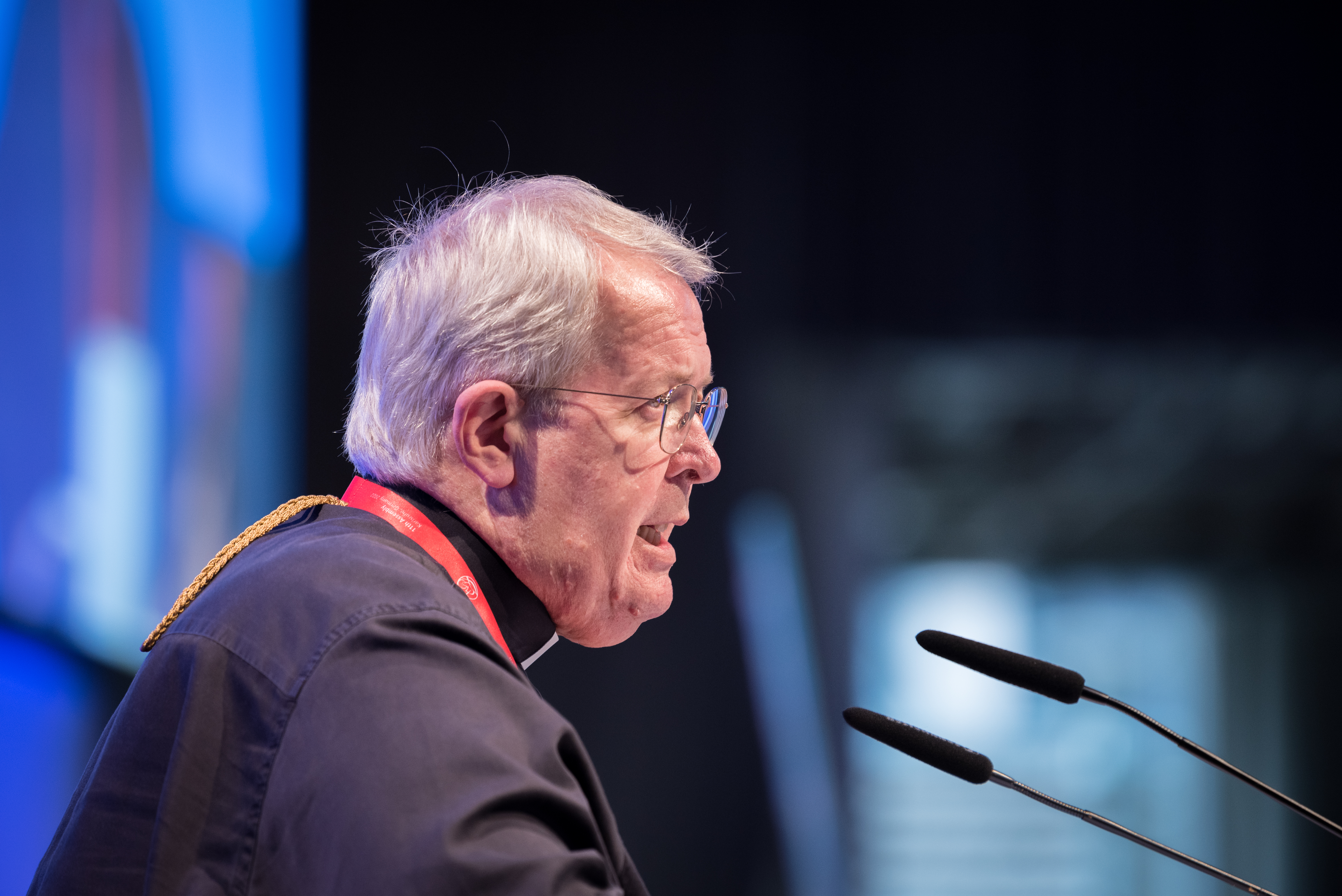
The Right Reverend Gregory Cameron, Bishop of St Asaph (pictured), chaired the committee that drew up the final message of the Assembly. It said, in part:
“Christ’s love moves the world to reconciliation and unity.” This love, in answer to the cries of those who are suffering, compels us to come to him in solidarity and to respond and act for justice. We are summoned to be reconciled in God’s love, and to witness to that love revealed in Christ (1 John 4:9-11). … Christians, and the structures that we have built, have been complicit in the abuse of others, and we must repent and join in this movement of reconciliation. In the face of war, inequality, and sins against creation today, Christ’s love calls us all to repentance, reconciliation, and justice.
Amid all our diversity, we have relearned in our assembly that there is a pilgrimage of justice, reconciliation, and unity to be undertaken together. Meeting together in Germany, we learn the cost of war and the possibility of reconciliation; Hearing the word of God together, we recognize our common calling; Listening and talking together, we become closer neighbours; Lamenting together, we open ourselves to each other’s pain and suffering; Working together, we consent to common action; Celebrating together, we delight in each other’s joys and hopes; Praying together, we discover the richness of our traditions and the pain of our divisions. ….
We long for a wider movement, the reconciliation and unity of all humanity, and indeed of the entire cosmos. This would be a unity in which God establishes justice, an equal place for all, through which creation may be renewed and strengthened. We rely on Christ’s love as we act and advocate for climate justice. We join our voices with the Amsterdam assembly (1948) that “war is contrary to the will of God,” and the Nairobi assembly (1975) that “racism is a sin against God.” We lament that we have to repeat these statements.
In our assembly, we have used many words, but from these we have fashioned a new resolve. Now we ask God’s assistance to transform our commitments into action. We commit ourselves to working with all people of good will. As we reflect on the fruits of our work in Karlsruhe, we invite all to become pilgrims together. For in Christ, all things will be made new. His love which is open to all, including the last, the least, and the lost, and is offered to all, can move and empower us in a pilgrimage of justice, reconciliation, and unity.
(The message can be read in full here).
Picture of Bishop Gregory Cameron: © Albin Hillert/WCC
POLICY BRIEFS
Life Beyond Borders Conference
Churches Together in Britain and Ireland (CTBI) and the Churches’ Refugee Network (CRN) will be hosting a conference on Tuesday 8 November 2022 at Liverpool Hope University to explore the local, national and international implications of borders on communities, including their impact on the most vulnerable in societies, such as refugees. It will also be a forum that brings together an array of organisations, groups and individuals from across Britain and Ireland who are engaged in asylum and refugee work in some capacity, and will show case the great work taking place by both church and secular groups in this area. You can register to attend this free event here.
Calls for volunteers
Welsh Government is appealing for more volunteers to host Ukrainian refugees in their homes. The government has funded Cytûn member Housing Justice Cymru to offer training and support for hosts to make the application process and subsequent experience less daunting. Welsh Government and Housing Justice Cymru are also working with Airbnb to provide short-term accommodation to Ukrainian refugees who need it.
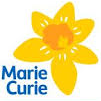
Marie Curie is looking to recruit community based volunteers for the Marie Curie Helper programme, which is a professional service provided by trained volunteers who offer one-to-one companionship and support to people with a terminal illness and their families. Helper Volunteers provide companionship and emotional support, practical support, short breaks for carers and help with signposting for information and support. For more information or if you have any questions regarding this role, please contact the Volunteering Operations Centre on volunteering@mariecurie.org.uk or on 0800 304 7032.
Launch of UK Bereavement Commission report
The report of the UK Commission on Bereavement, chaired by the Rt Revd Sarah Mullally, Bishop of London, is to be launched on October 12, in London and online. (The event was postponed from September 12). Cytûn contributed evidence to the report on behalf of churches in Wales, relating to the experience of the Covid 19 pandemic, and to the bereavement needs of people of faith – including how bereavement may affect faith and doubt, and the importance of prayer for many religious people when supporting a loved one through the end of life and then facing bereavement. You can book to attend online using the link above.
Act for Nature in the Gower
A Rocha UK has arranged its first ever ‘Act for Nature Day’ in Wales at St Madoc’s Centre, Llanmadog, Gower, 10am and 2pm on Thursday 13th October and is open to churches and local people. It’s an opportunity to learn more about nature and get up close and personal with it via a walk with a knowledgeable ecologist, and then back at the centre for some hands-on activities, such as pond dipping and crafts with nature. It is free, but booking is essential here.
CONTACTING CYTÛN’S POLICY OFFICER
Parch./Revd Gethin Rhys – Swyddog Polisi/Policy Officer
Cytûn – Eglwysi ynghyd yng Nghymru/Churches together in Wales
Registered office: Room 3.3, Hastings House, Fitzalan Court, Cardiff CF24 0BL
Mobile: 07889 858062
E-mail: gethin@cytun.cymru www.cytun.co.uk @CytunNew
Hapus i gyfathrebu yn Gymraeg ac yn Saesneg.
Happy to communicate in Welsh and English
Cytûn is a registered company in England and Wales | Number: 05853982 | Registered name: “Cytûn: Eglwysi Ynghyd yng Nghymru/Churches Together in Wales Limited” | Cytûn is a registered charity | Number: 1117071
Publication date: September 28 2022. The next Bulletin will be published on November 29 2022.
